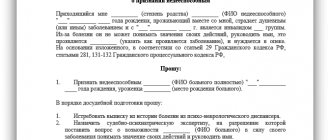Home / Family law / Adoption and guardianship
Back
Published: 08/16/2018
Reading time: 6 min
0
211
By registering guardianship over their ward, citizens acquire a number of rights and obligations, the implementation of which is controlled by the guardianship and trusteeship authority. For improper performance of duties, the relevant authorities may deprive of guardianship.
- Legislation
- Grounds for termination of guardianship and trusteeship of children
- Features of termination of guardianship and trusteeship of adults
Guardianship can also be terminated on the initiative of the guardian himself and in the presence of a number of other grounds provided for by law.
Features of refusal of guardianship
Content
Guardianship is a form of care for a citizen who, due to age or health condition, cannot take care of himself. Guardianship is appointed over minors and incompetent citizens.
Guardianship is carried out on a voluntary basis. Powers can be assigned to a guardian only with his personal consent. Coercion in this matter is not allowed.
The ward must also give consent to the appointment of guardianship. Children aged 10 years and over and adult citizens who can do so can approve the candidacy of a guardian.
Guardianship is granted for a long term.
For example, guardianship of a child is formalized until he reaches adulthood. And over an incapacitated person - until his death or until his legal capacity is restored.
But the situation in the caregiver's family may change.
For example, a citizen may get sick or lose his job.
In such a situation, he may refuse to perform his duties. To do this, you need to contact the guardianship department.
Above the child
The main reasons for refusing child custody are lack of contact with the minor and changes in the family situation of the guardian.
Changes mean:
- birth of a child;
- emergence of other dependents;
- disease;
- job loss;
- divorce;
- loss of housing.
In such a situation, it is difficult for a citizen to properly fulfill the duties of a guardian.
If there is no contact in the guardianship family, the guardian and ward must undergo crisis support. The parties to the conflict can receive support from specialists (lawyers, psychologists, teachers).
Important! The guardian has the right to refuse crisis support.
If there are several children in a family, then the abandonment of one of the brothers and sisters is not provided for. This possibility exists only if one of them has a disease.
Over the incapacitated
In most cases, guardians of incapacitated persons are close relatives (children, parents, brothers and sisters).
In case of refusal, the incompetent citizen will be placed in a specialized organization. The caregiver must be prepared for this.
The procedure for abandoning an incapacitated ward is simpler than abandoning a child. The law does not provide for the process of accompanying such families.
Important! In 2020, there is no provision for a centralized system of support for guardianship families with incapacitated citizens. Therefore, caregivers are left alone with their problems. And they are more susceptible to psychological burnout. This is often the reason for refusals.
over an elderly man
Children usually become guardians of older citizens. Therefore, relinquishing custody of a parent is an uncommon situation.
In addition, the guardian is the recipient of various benefits and allowances that will cease to apply from the moment of refusal. This is also the reason that refusals of guardianship of this category of citizens are a rare occurrence.
How to refuse custody of a child?
Ch. 6 Federal Law No. 48 of 2008 establishes the procedure for terminating guardianship and trusteeship.
The law defines 3 grounds for termination of the functioning of a foster family:
- at the initiative of the guardian;
- at the initiative of the guardianship department;
- at the initiative of the child.
A citizen can submit an application and refuse to raise a ward for a number of reasons. They are not expressly specified in the law. Therefore, the guardian has the right to initiate a refusal at any time.
Main reasons for return:
- Relocation of a guardian . The reason for return is the child’s reluctance to leave the locality or the impossibility of the guardian to take him with him.
Example . Citizen Zh. was the guardian of minor K. When she learned about her mother’s illness, she decided to move. Since the disease was serious and the woman required care, citizen Zh. had to give up her care.
- Illness of the substitute parent . The health status of the guardian must be examined before guardianship is assigned. If a number of diseases are detected, the citizen will not be able to fulfill the duties of a surrogate parent. However, if illness appears after the appointment of guardianship, he cannot be removed for this reason. In some cases, illness interferes with the performance of duties. Therefore, the substitute parent can return the pupil.
- Child's illness . A prerequisite for the appointment of guardianship is that the minor undergoes a medical examination. The caregiver must become familiar with all diagnoses. If a complex disease is detected that was not indicated in the conclusion, the guardian has the right to refuse to perform duties.
Example . Citizen O. decided to take custody of minor R. The girl was recently placed in an orphanage. Her mother was deprived of parental rights and her father is unknown. Citizen O. took the girl from another region and brought her home. 7 days after the appointment of guardianship, the woman found out that the ward was HIV-infected. The guardian had to refuse to perform her duties, since she had 2 more girls under her care. She was afraid of their infection. The child was transferred to the care of the child welfare department.
- Family circumstances . When registering guardianship, a citizen is based on the current family situation. However, any changes may negatively affect the capabilities of the substitute parent. Having a student places great responsibility on the citizen. Therefore, if it is not possible to independently resolve the situation, it is allowed to refuse guardianship.
Example . The family of Ilya and Marina adopted young Ivan. After 2 years, Ilya filed for divorce. He did not want to take the child with him. Marina could not combine raising a child and working. Therefore, she abandoned the pupil.
These are just popular reasons for abandoning a student. In practice, various situations arise that are difficult to foresee when registering guardianship.
Revocation of guardianship by the guardianship department
An alternative option for terminating guardianship is the release of the guardian at the initiative of the guardianship department. This procedure is called removal.
It is implemented by the guardianship department as a means of protecting the ward from the unlawful actions of the guardian. That is, if there is strong evidence that the rights of the pupil are being grossly violated, the guardianship department has the right to remove the powers of the guardian unilaterally.
Main reasons for removal:
- committing a crime against a ward;
- committing a crime against another citizen with punishment in the form of actual imprisonment;
- violation of children's rights;
- abuse of rights in relation to a minor or incompetent pupil.
Important! A person removed from acting as a guardian must be entered into a regional data bank. As a result, he is deprived of the right to further perform the duties of a guardian, trustee, or adoptive parent.
Guardianship concept
The regulatory framework for guardianship relations is Federal Law No. 48-FZ of April 24, 2008 “On guardianship and trusteeship.” Let us list its most important provisions.
Article 2 interprets guardianship as a form of family arrangement for minors, disabled or incompetent persons, established by the competent authorities for the upbringing and protection of the interests of the ward. As part of the status of a guardian, the person entrusted with the corresponding responsibilities is called upon to represent the interests of the ward without any additional supporting documents, except in cases expressly stated in the law.
Guardianship is carried out with the purpose of assisting a minor in the exercise of his rights, performance of duties, and protection from attacks by third parties. In relation to an adult ward, the trustee must give consent to him concluding large property transactions, spending earnings and other income in his interests.
Guardianship can be established over a minor child, and a teenager from 14 to 18 years old (up to 21 years old if he is studying full-time at a university) is taken under guardianship.
Articles 4-5 of the previously mentioned law define the tasks of the state in terms of regulating guardianship activities and the principles by which it is guided. Article 7 talks about the tasks of guardianship and trusteeship authorities, for example, the duty to protect the rights of citizens who need it, control over the safety of their property, and supervision of the activities of guardians.
Link to document: “On guardianship and trusteeship”
Types of guardianship
Guardianship can be established:
- in the general order - then it is permanent and ends on the grounds provided for by law;
- in a preliminary manner - involves temporary care for the ward until a solution to his problem is found in any of the ways permitted by law.
Permanent guardianship can be free or paid. Free guardianship is usually taken by close relatives of children left without parents, or elderly people who do not have children of their own. Paid guardianship is common among third parties who expect financial compensation for their efforts in raising other people's children or caring for the elderly or sick from the state.
Procedure for relinquishing guardianship
The procedure for voluntary release from the duties of a guardian can be divided into the following stages:
- Preparation.
- Contact the guardianship department.
- Transfer of the ward.
- Documents receiving.
- Delivery of the ward's property and report.
On average, the procedure takes no more than 2 weeks. It must be remembered that the guardianship department cannot refuse to relieve the guardian of his duties.
However, one of the indicators of the department's performance is the number of children returned and incapacitated guardians. This indicates a low level of work to prevent repeated orphanhood. Therefore, specialists will create obstacles.
Stage 1. Preparation
If the decision is made carefully, then it is necessary to prepare all the child’s documents.
The guardian must convey:
- birth certificate;
- SNILS;
- medical insurance;
- individual rehabilitation program and ITU certificate (for disabled people);
- civil passport (if available);
- documents on the death of parents or other data confirming status;
- documents for the ward’s property;
- certificate of inheritance rights;
- certificate of payment of alimony;
- guardian's certificate.
Stage 2. Contacting the guardianship department
In order to be released, it is advisable to notify the guardianship department in advance. Since the regulations provide for the need for crisis support.
The process takes place over 3 to 6 months.
There are 2 types of crisis support:
- the child continues to live with the guardian, and they are accompanied together;
- the child is placed in a rehabilitation center, and services are provided to the parties individually.
Thus, the guardian will be offered to preserve the family and receive help from qualified specialists. However, in 2020, there is no established support system in the Russian Federation. Therefore, even after receiving services, the guardianship family often breaks up.
The guardian has the right not to undergo the procedure, but to refuse it in writing. The refusal is issued together with an application for release from duties.
Stage 3. Transfer of the ward
The child is transferred to a specialist from the guardianship department in person or through a rehabilitation center.
If a guardian brings a child to the guardianship department, he brings personal belongings and documents with him.
If a student is placed in a rehabilitation center, personal belongings are transferred to the organization, and documents are transferred to the guardianship department.
Stage 4. Receiving documents
Guardianship terminates from the moment the resolution on the guardian's release is signed. The citizen receives his copy and signs a second copy for the guardianship department.
From this moment, the mutual rights and obligations of the parties cease.
Stage 5. Delivery of the ward’s property and report
The last step is the transfer of children's property. The guardian is obliged to transfer together with the child all objects of property that are indicated in the register of property of the ward.
If the minor owns the property, the guardian hands over the keys.
Within 3 days from the date of the decision, the citizen must submit a guardianship report. Moreover, it does not matter whether it has already been completed this year. It must reflect the composition of the minor’s property at the time of termination of guardianship.
After which, the guardian must obtain permission to remove the child from registration (if he was registered in the apartment).
Procedure
From the moment guardianship over the incompetent is canceled, responsibility for it rests with the guardianship department. After completing the necessary documents, the ward is transferred to a specialized organization.
From the moment the order for placement under supervision is issued, the duties of the guardian are transferred to the head of the institution. He is also responsible for the safety of the ward’s property.
Algorithm of actions:
- Consultation with a specialist.
- Filling out an application.
- Return of documents and property of an incapacitated person
- Obtaining an order for the release of a guardian
- Submitting a report
Consultation with the guardianship department
Refusal of guardianship of an adult does not provide for the need for crisis support. The specialist will not convince you to keep the foster family. The decision rests entirely with the guardian.
The department specialist must provide a list of documents for processing the refusal and clarify the deadline for transferring the incapacitated citizen to a specialized organization.
Important! It is necessary to be prepared for the fact that an incapacitated ward will live with the guardian’s family until a place in a boarding home is selected. This may take from 10 to 30 days.
Submitting an application
A document for relinquishing guardianship of an incapacitated ward must contain the following information:
- position and full name heads of local administration;
- applicant details;
- Title of the document;
- request for withdrawal of powers;
- information about the appointment of guardianship, details of the order;
- details of the ward;
- reasons for release from guardianship;
- date and signature.
Sample application for release from duties of guardian of an incapacitated person
Return of documents and property of an incapacitated person
When submitting an application, the citizen must return all original documents of the incapacitated person and the certificate of the legal representative. It is also necessary to prepare the ward's movable property.
If the guardian lived with the ward in his apartment, then in case of refusal he is obliged to vacate the living space. He is also obliged to notify the Pension Fund about the cancellation of guardianship. If an excess amount of compensation is paid, the funds will be withheld from the ward.
Consequences for the ward and guardian
Main consequences for the guardian and ward:
- mutual rights and obligations cease;
- all assigned payments (benefits, remuneration, cultural benefits) are terminated;
- all benefits for the guardian are lost;
- the minor loses the right to reside in the guardian’s apartment;
- The guardian loses the right to use the ward's property.
Important! If, before the release of the guardian, the court ordered him to pay compensation for harm caused to the ward, the obligation remains until the debt is repaid.
Legal consequences
When submitting an application to renounce guardianship to the PLO, you must state good reasons why you decided to stop caring for the ward .
Even after submitting an application to terminate guardianship or trusteeship, you can change your mind and withdraw the document. In this case, the ward child or adult remains in the family.
But it will most likely not be possible to return the ward after the decision has been made. Representatives of the PLO are obliged to protect the rights of children and helpless adults from the irresponsible, selfish, criminal behavior of guardians and trustees.
The guardian or trustee must be fully aware of the legal consequences of such a decision.
If guardianship or guardianship is terminated, the care of the ward is entrusted to the PLO. As a rule, the ward is transferred to a specialized institution: medical, educational, educational. The head of the institution is responsible for the maintenance, care, education of the ward, storage of property, and disposal of the ward’s income in his interests.
Refusal of guardianship or trusteeship is a voluntary decision that does not carry any administrative or material consequences for the guardian or trustee if he conscientiously performed his duties in relation to the ward. He does not lose the right to subsequently regain custody of a child or adult as if he were removed for a crime or violation of the rights of the ward. He is not subject to a fine, he is not obliged to return benefits and payments that he received from state or local authorities.
Compensation can be claimed only for damage to the ward's property or waste of the ward's income, and punishment can be claimed for a crime committed against the ward.
In most cases, the decision to stop caring for a child, sick or elderly person in their care is difficult for many, and only insurmountable circumstances force them to take such a step.
Expert opinion
Semyon Frolov
Lawyer. 7 years of experience. Specialization: family, inheritance, housing law.
Perhaps you need the help of a lawyer to protect the rights of a ward, or advice on painless and safe relinquishment of guardianship - write to us in the chat or call the hotline.
Attention!
- Due to frequent changes in legislation, information sometimes becomes outdated faster than we can update it on the website.
- All cases are very individual and depend on many factors. Basic information does not guarantee a solution to your specific problems.
That's why FREE expert consultants work for you around the clock!
- via the form (below), or via online chat
- Call the hotline:
- Moscow and the Region
- St. Petersburg and region
- FREE for a lawyer!
By submitting data you agree to the Consent to PD Processing, PD Processing Policy and User Agreement.
Anonymously
Information about you will not be disclosed
Fast
Fill out the form and a lawyer will contact you within 5 minutes
Tell your friends
Rate ( 2 ratings, average: 5.00 out of 5)
Author of the article
Irina Garmash
Family law consultant.
Author's rating
Articles written
612
Is it possible to become a guardian after voluntary refusal?
Before answering this question, we suggest that you familiarize yourself with the situation.
Case study:
Citizen R. quarreled with her grandson, for whom she acted as guardian. To punish the ward, the woman wrote a refusal to the guardianship department. The child was placed in an orphanage. At this time, family B contacted the guardianship department. They collected documents and took the boy. Although the grandmother tried to prevent the registration of guardianship and take her grandson back, department specialists regarded her action as unreliable. The child was transferred to a family of strangers.
The above example illustrates a very popular situation. The citizen succumbs to momentary emotions and issues a refusal. However, fixing the situation is not so easy.
The release of the guardian does not prohibit the re-adoption of children into the family. But it is almost impossible to return the same child.
The guardianship department will not allow the child to be subjected to emotional shock again. Most likely, the minor’s right to family upbringing will be realized in another family.
Thus, after removal, you can no longer become a guardian. If released, it is possible, but most likely the same child will not be given into the family.
How to transfer guardianship to another person?
In the event of conflicts at the everyday level or the presence of other unfavorable factors, the interested person has the right to apply to the guardianship authorities with a request to deprive him of guardianship rights.
If the person receiving guardianship has reached the legal age, he can do this on his own. Thus, according to Article 39 of the Civil Code of the Russian Federation, a guardian may be deprived of his rights in the prescribed manner in the event of:
the presence of disagreements, constant quarrels and other contradictions at the everyday level between the parties; if the minor child was returned to his biological parents;
a minor child has been adopted; if the ward was placed under supervision and direct care in appropriate educational, medical, social institutions. And also, if this decision does not harm the ward
In any case, it is important to respect the interests of the incapacitated citizen; the law provides for deprivation of guardianship rights at one’s own request; This is also possible at the initiative of the guardianship authorities, if they prove the destructiveness of the relationship between the parties. Such conclusions are drawn on the basis of a report made by a special commission.
It is also important to pay attention to the provisions set out in Article 56 of the Family Code. Thus, the child has the right to:
- protection of rights and personal interests provided for by law. This protection is carried out by interested parties: his parents or citizens replacing them, guardianship authorities, the court and directly the prosecutor. Persons recognized as legally competent before reaching the age of majority have the right to defend their rights and interests independently;
- protection from abuse or excess of the rights assigned by law in relation to parents or persons replacing them. Thus, if a guardian regularly violates the interests and rights of a minor, he may be deprived or limited in his rights in relation to the child. In turn, a person who has reached the age of 14 can defend his rights independently in any government institution or body, including in court. If a child is under 14 years of age, he can seek help from the guardianship authorities, who in turn are obliged to respond in the manner prescribed by law;
- any individual or legal entity who becomes aware of a violation of the rights of a child is obliged to report this to the guardianship authority, which in turn is obliged to respond accordingly.
Thus, the state in every possible way protects the rights and interests of the least protected sections of the country’s population. Based on these provisions, it is possible to remove the guardian from performing his duties.
Deprivation of guardianship rights on the basis of Article 39 of the Civil Code of the Russian Federation is possible both on a temporary and permanent basis.
Reasons
Refusal of guardianship may be justified for personal and financial reasons.
In addition to emotional incompatibility with the ward, any situations are possible that lead to the impossibility of raising a minor or caring for an adult.
Financial reasons include the guardian’s lack of necessary income or insufficient funds for maintenance and upbringing.
A deterioration in the financial situation of the guardian may also be grounds for refusing to care for the ward.
Refusal should not be confused with the termination of guardianship by a court order or after criminal proceedings have been initiated against the guardian for causing harm to the ward.
In such a situation, guardianship is terminated without the will of the guardian.
Legislative regulation
The main regulatory document is the Civil Code of the Russian Federation. The concept of guardianship and requirements for guardians are described here.
The third part of Article 35 of the Civil Code states that this process is voluntary and approved by the consent of the subject, and also describes the conditions for becoming a guardian.
Article 36 of the same code regulates their duties. Article 39 talks about possible reasons that are grounds for terminating a guardianship relationship.
The Federal Law on Guardianship and Trusteeship, which was approved in April 2008, regulates a variety of family relationships. It specifies the grounds for starting this kind of relationship, sets requirements for a potential candidate and outlines the powers of the guardianship authorities that monitor this process.
Resolution No. 423 of May 2009 has no less significant legal requirements regarding the procedure; an algorithm of actions is outlined for its establishment.
In 2013, Resolution No. 117 was issued in the Russian Federation, which lists a list of diseases for which a citizen cannot become a guardian.
Features of termination of guardianship and trusteeship of adults
Guardianship is established over an adult citizen if he is declared legally incompetent, and guardianship is established if the person is recognized as having limited legal capacity.
Guardianship or trusteeship of an adult citizen may be terminated if his health condition improves. The decision that a person has regained legal capacity is also made by the court.
A claim to recognize a person as legally competent can be filed by one of the relatives, a guardian (trustee), a representative of the PPP or a medical institution. The court makes a decision based on the forensic psychiatric examination provided along with the application.
Guardianship is terminated after the entry into force of a court decision recognizing the person as fully capable.
If a citizen is only partially limited in legal capacity, then he can independently file a claim for recognition of his legal capacity.
If patronage has been established over an adult, the ward can also refuse it at his own request, as well as if he is sent for a long-term stay in an appropriate medical institution.
A guardian or trustee may be removed from his obligations not only if the guardianship authority reveals any violations, but also if third parties report such violations.
For example, neighbors may complain about a guardian's rude behavior towards a ward or the guardian's excessive use of alcohol. If a complaint is received from third parties, the OPP urgently conducts an inspection of the guardian and his ward, as well as living conditions. If the testimony of witnesses is confirmed, then the person guilty of improperly fulfilling his obligations is removed from guardianship and may be held accountable.
If the person who was removed from guardianship does not agree with the decision made, then he has the right to file a claim with a judicial authority. To confirm the illegality of the decision made by the guardianship and trusteeship authority, the plaintiff will be required to present weighty arguments.
The guardianship and trusteeship authority has the right not only to establish guardianship and trusteeship over adult and minor citizens, but also to monitor the fulfillment of obligations by guardians (trustees), as well as to remove and release them from these obligations. This is possible only in accordance with the procedure and if there are grounds established at the legislative level.
Failure to comply with requirements for a guardian
When registering guardianship, special requirements are placed on the personality of the guardian. If, after the establishment of guardianship, circumstances are identified that prevent the appointment of a guardian, it is subject to termination. Such circumstances include:
- conviction for committing a crime against life and health, sexual integrity and a number of other elements - deprivation of guardianship will follow even if the victim of the crime was a person not under guardianship;
- establishing medical diagnoses of chronic alcoholism and drug addiction;
- incapacity of the guardian established by a judicial act;
- the presence of diseases that impede care;
- the caregiver’s need for outside care, as well as other reasons.
In these cases, the guardian's actions may not necessarily violate the interests of the ward, but his personal characteristics do not allow him to provide adequate care. Since the guardian is involved in verifying the grounds for deprivation, he may voluntarily agree to early annulment of the deed.
Guardianship will also be canceled if, when appointing it, false information about the identity of the guardian or forged documents was provided. For example, a potential guardian may deliberately falsify a medical certificate in order to achieve a positive decision.









